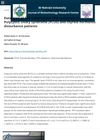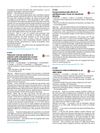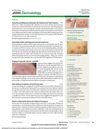 3 citations,
February 2016 in “Endocrinology and Metabolism Clinics of North America”
3 citations,
February 2016 in “Endocrinology and Metabolism Clinics of North America” Manage women's cholesterol with diet, exercise, and careful treatment choices, especially during pregnancy, PCOS, and menopause.
 3 citations,
August 2015 in “Diabetes and Metabolic Syndrome: Clinical Research and Reviews”
3 citations,
August 2015 in “Diabetes and Metabolic Syndrome: Clinical Research and Reviews” Married women with type 2 diabetes had a surprisingly low infertility rate, suggesting type 2 diabetes and PCOS may be different conditions.
 3 citations,
January 2012 in “Hanyang Medical Reviews”
3 citations,
January 2012 in “Hanyang Medical Reviews” The document concludes that more research is needed to create suitable diagnostic criteria and understand PCOS in Korean women, and genetics may allow for personalized treatment.
 2 citations,
February 2021 in “International Journal of Environmental Research and Public Health”
2 citations,
February 2021 in “International Journal of Environmental Research and Public Health” Women with PCOS tend to be less optimistic than those without it.
 2 citations,
June 2017 in “Journal of The American Academy of Dermatology”
2 citations,
June 2017 in “Journal of The American Academy of Dermatology” The type of PCOS a woman has doesn't strongly predict her skin or metabolic symptoms; obesity is a more important factor.
 2 citations,
May 2017 in “International journal of reproduction, contraception, obstetrics and gynecology”
2 citations,
May 2017 in “International journal of reproduction, contraception, obstetrics and gynecology” Myoinositol helps improve menstrual cycles and some skin issues in women with PCOS.
 2 citations,
June 2014 in “مجلة مركز بحوث التقنيات الاحيائية”
2 citations,
June 2014 in “مجلة مركز بحوث التقنيات الاحيائية” Five different TPO gene mutations were found in PCOS patients with thyroid hormone issues.
 2 citations,
January 2014 in “Springer eBooks”
2 citations,
January 2014 in “Springer eBooks” Polycystic Ovary Syndrome (PCOS) often leads to severe acne, and lifestyle changes and hormonal treatments can help manage it.
 2 citations,
October 2008 in “The Journal for Nurse Practitioners”
2 citations,
October 2008 in “The Journal for Nurse Practitioners” The document concludes that managing PCOS requires a comprehensive approach, including lifestyle changes and medication, to improve symptoms and reduce health risks.
 1 citations,
May 2016 in “The Nurse Practitioner”
1 citations,
May 2016 in “The Nurse Practitioner” Treating PCOS is complex, involving medication like metformin and lifestyle changes, and requires attention to mental health due to high depression and anxiety rates.
 1 citations,
December 2022 in “Gynecological Endocrinology”
1 citations,
December 2022 in “Gynecological Endocrinology” The most common skin issues in females with Polycystic Ovary Syndrome (PCOS) are excessive hair growth, hair loss, oily skin, acne, dark skin patches, and skin tags, which may be linked to hormone and insulin levels.
1 citations,
January 2009 in “PubMed” PCOS affects many women and can cause various health issues, with several treatments available.
 August 2024 in “Skin Research and Technology”
August 2024 in “Skin Research and Technology” Omega-6 and LDL cholesterol increase the risk of hair loss.
 October 2023 in “Frontiers in endocrinology”
October 2023 in “Frontiers in endocrinology” Effective PCOS treatments require targeting specific signaling pathways.
 January 2021 in “Turkiye Klinikleri Journal of Dermatology”
January 2021 in “Turkiye Klinikleri Journal of Dermatology” The MPV/PC ratio can help assess disease activity in alopecia areata.
January 2024 in “Medicina” Statins may help treat PCOS by lowering androgen levels and improving cholesterol.

Acne in PCOS can be managed with specific treatment strategies.

Hair loss in women with PCOS is linked to high androgen levels but the relationship is unclear.
 December 2023 in “Migration letters”
December 2023 in “Migration letters” Herbal treatments can help manage PCOS symptoms.
 May 2023 in “Journal of Student Research”
May 2023 in “Journal of Student Research” Creating specific biological indicators is important for early detection and treatment of PCOS.
 January 2023 in “International journal of medical science and health research”
January 2023 in “International journal of medical science and health research” Anovulatory PCOS patients are younger with longer cycles and higher blood pressure and hormone levels.
 December 2022 in “International journal of preventive, curative & community medicine”
December 2022 in “International journal of preventive, curative & community medicine” PCOS is a common hormonal disorder in women, causing symptoms like acne and irregular periods, and is managed with medication and lifestyle changes.
 December 2022 in “BioScientific review”
December 2022 in “BioScientific review” PCOS is a hormonal disorder in women that can cause infertility and increases the risk of heart and metabolic issues.
 May 2020 in “Fertility and Sterility”
May 2020 in “Fertility and Sterility” Nonobese, normotensive Indian women with PCOS may have a higher risk of heart problems linked to inflammation and insulin resistance.
 February 2020 in “İstanbul medical journal”
February 2020 in “İstanbul medical journal” Metformin improves early signs of heart disease in women with PCOS and raises apelin levels, but doesn't significantly change artery thickness.
 January 2020 in “Egyptian Journal of Dermatology and Venereology”
January 2020 in “Egyptian Journal of Dermatology and Venereology” People with alopecia have shorter hair follicles and more c-kit, a stem cell factor receptor, which could predict how the condition progresses.
 January 2018 in “Deleted Journal”
January 2018 in “Deleted Journal” Managing PCOS effectively requires focusing on psychological health, lifestyle changes, and medication.
 April 2017 in “European Psychiatry”
April 2017 in “European Psychiatry” Women with schizophrenia on atypical antipsychotics are more likely to have polycystic ovarian syndrome (PCOS) than women without schizophrenia.
 September 2016 in “JAMA Dermatology”
September 2016 in “JAMA Dermatology” Melanoma patients can learn to check their skin, early balding in men may indicate similar risks as PCOS in women, certain criteria can help predict skin cancer behavior, small skin cancer may not need extra therapy after surgery, and sterile gloves don't reduce infection in minor surgeries.
 April 2016 in “JAMA Dermatology”
April 2016 in “JAMA Dermatology” Acne is not a key diagnostic feature for PCOS, postadolescent men with acne may have insulin resistance, melanoma patients often have few moles, tumor size in CSCC indicates higher risk of serious outcomes, and hidradenitis suppurativa is linked to higher risk of heart problems and death.




























